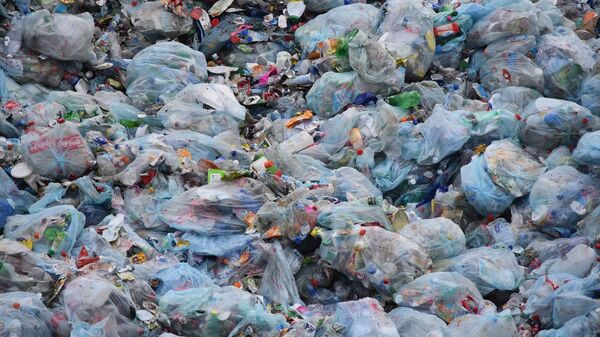Indian Prime Minister Modi in his latest radio address "Mann ki Baat" (Talks of the Heart) lauded ecological warrior Pradeep Sangwan for his relentless mission to clean the Himalayas of plastic and waste. This self-motivated green soldier refuses to stop and continues healing the mountains. Sangwan, 35, told Sputnik about his journey that began in 2014 and how irresponsible tourism has had a devastating impact on the Himalayas.
Sputnik: What is the purpose behind your trekking and cleaning?
Pradeep Sangwan: Trekking has been my interest since my college days. I used to regularly travel to the Indian state of Himachal Pradesh. The litter that I used to find while trekking, moulded my interest into the purpose behind "Healing Himalayas". I am interested in trekking and long for the environment and cleanliness. The mountains have guided me in my most difficult times, and accepted me as I am. It is therapeutic working in and for the Great Himalayas. It is not possible to imagine a world without nature.
Sputnik: Tell us a little bit about your background and what prompted you to take up this initiative?
Pradeep Sangwan: I belong to a middle-class family from the Indian state of Haryana. My father served the country as a soldier, so empathy towards society is in my genes. My interest in sports, especially trekking from my college days, took me ahead in serving the Himalayas and Mother Nature.
It was nerve-racking for me to see the littered mountains. The irresponsible behaviour of trekkers and my sensitivity towards the environment kept me going.
Sputnik: How do you promote your campaign? How can people get in touch with you?
Pradeep Sangwan: My organisation "Healing Himalayas" has a social media handle on Instagram, Facebook, and LinkedIn. This has been the only source of communication between the organisation and volunteers. Whenever we organise a cleaning drive or a plantation initiative, we put out posters on social media and that's how interested people contact us. There is no age criteria, however, at the moment they should be COVID negative. Those who associate with me are equally passionate about the cause.
We undertake the campaign all through the year, covering almost 2,000 km of trekking trails. I target our initiative at places where tourist footfall is higher. We trek and clean from March until the festival of lights - Diwali - (that falls in either October or November). In winters, I engage with other groups working in the plains and back in my native state.
Sputnik: How did you coin the name of your organisation that is in sync with the mission you are undertaking?
Pradeep Sangwan: It was the first and only name that came into my mind. It is always soothing to hear "Healing Himalayas" and what it represents is even better.
Sputnik: How did you feel when Indian Prime Minister Modi lauded your efforts in his radio address?
Pradeep Sangwan: I am really thankful to Indian Prime Minister Modi and to everyone who has recognised our bit.
Today our Prime Minister shared about the work we do to preserve Himalayas in Mann ki Baat. I am extremely humbled and honoured, it’s only possible because of your contribution, participation and love.
— Pradeep Sangwan (@iPradeepSangwan) December 27, 2020
Gratitude 🤗☘️
Himalayas 🏔@RandeepHooda pic.twitter.com/otem9guSUa
Sputnik: In this positive initiative of yours, would you want any kind of help from the government?
Pradeep Sangwan: Just like the way the prime minister promoted yoga by observing International Yoga Day in the month of June, he can do this too. A day can be dedicated when all citizens can plant one sapling across the length and breadth of the country.
Sputnik: What's the approximate amount of waste you have retrieved so far? Can the waste be recycled?
Pradeep Sangwan: The waste we collect is recycled at energy plants. However, sometimes it cannot be recycled as it is heavily degraded. Thus, we are trying to build small scale waste units in remote regions of the mountains for collection.
Sputnik: What are your next projects?
Pradeep Sangwan: We have charted a cleaning drive for 2021 that starts in March and will continue until July. We organise approximately 40-45 cleaning campaigns every year.



